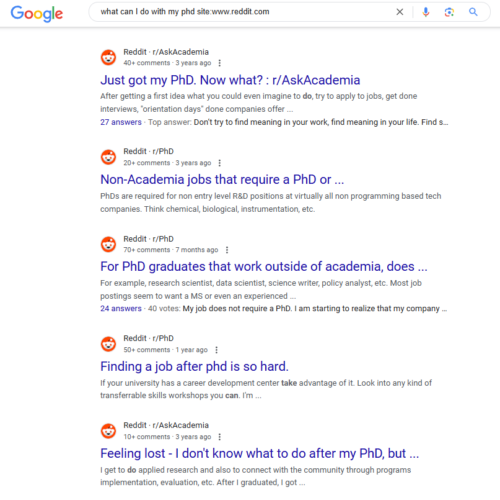Every day, I come across posts asking the same question: What can I do with my PhD in [field]? I see these types of posts regularly on LinkedIn, X/Twitter, and Reddit.

While it can indeed be challenging to envision a career path for a PhD in the humanities or social sciences—where direct industry equivalents may not be immediately apparent—chances are that someone has already navigated a similar journey. With a targeted search on LinkedIn, using specialized techniques called Boolean operators, you can find individuals whose profiles align with your career interests. Boolean operators, such as “AND,” “OR,” and “NOT,” allow you to refine your search, making it easier to locate relevant profiles that showcase diverse career trajectories.
Examples of Boolean Operators
Belowe are examples of types of boolean operators you can use in LinkedIn.
- Quotation marks ( ” ” ) will return exact phrase.
- NOT will exclude certain results.
- AND will return all items.
- OR will return or one or the other.
Boolean operators that aren’t supported include * + -.
How to Make a Search in LinkedIn Using Boolean Operators
Once your account is set up, the search bar opens up numerous opportunities to explore publicly available profiles. Enter your desired search terms here to get started.

Here is an example of what to type in the search bar:
Template:
“[Your Degree]” NOT Professor NOT [Other Academic Career Role] AND (Career Title OR Other Career Title)
An Example
“PhD in History” NOT Professor NOT Historian AND (Researcher OR Consultant OR Writer)
There are some downsides you may encounter including having to refine your search or having difficulty initially to find someone with a career path you can gain insight from. The goal here is to expand your horizons of what is possible with your degree path.
What To Do After You Search – Reach Out
Once you’ve completed your search on LinkedIn, take a closer look at individual profiles. Identify the steps they took to secure their current role, and review the types of positions they held during and after their Ph.D. Remember, you’re not alone in this journey—many individuals with similar backgrounds have successfully transitioned, and you can use their experiences as a potential blueprint for your own path.
If you are still unsure how the individuals made the pivot, don’t be afraid to message them. Better yet, request an informational interview.
Support After Your PhD on Patreon
If you found this article helpful, consider following After Your PhD on Patreon!
You can also request a LinkedIn Profile Review from myself if needed.

Ryan Collins PhD is an SEO Strategist at Go Fish Digital. Ryan completed his PhD in Media Arts and Sciences at Indiana University Bloomington in 2021. During his time at Indiana University, Ryan eventually pivoted into a career in SEO and Digital Marketing after having informational interviews with working professionals in SEO, working on side projects, and gaining industry experience.
